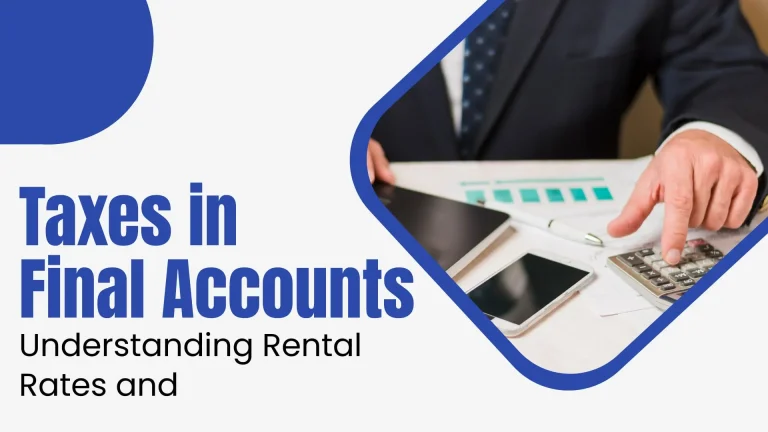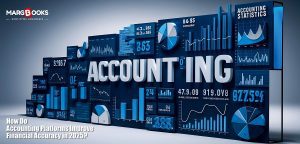Managing rental rates and taxes in final accounts is a crucial aspect of financial management for businesses and property owners. Properly accounting for rental income, expenses, and associated taxes ensures accurate financial reporting, compliance with tax regulations, and better financial planning. In this comprehensive guide, we will delve into the details of rental rates and taxes in final accounts, discussing key concepts, common challenges, and best practices for effective financial management.
Understanding Rental Rates in Final Accounts
What Are Rental Rates?
Rental rates refer to the amount of money a tenant pays to a landlord for the use of a property. This can include residential properties, commercial spaces, or any other type of real estate. Rental income is a significant source of revenue for property owners and must be accurately recorded in the final accounts.
Recording Rental Income
Accurately recording rental income is essential for maintaining precise financial records. Rental income should be recognized on an accrual basis, meaning it is recorded when it is earned, not necessarily when it is received. This ensures that income is matched with the period in which it was earned, providing a clear picture of financial performance.
Lease Agreements
Lease agreements are legal contracts that outline the terms and conditions of the rental arrangement. These agreements specify the rental rate, payment schedule, duration of the lease, and any additional charges or responsibilities. Understanding and correctly interpreting lease agreements is crucial for accurately accounting for rental income and expenses.
Impact of Rental Rates on Financial Statements
Rental rates directly impact several financial statements, including the income statement, balance sheet, and cash flow statement. In the income statement, rental income contributes to the total revenue, while related expenses, such as maintenance and property management fees, are deducted to calculate net income. On the balance sheet, rental income affects the accounts receivable and cash balances. The cash flow statement reflects the cash inflows and outflows related to rental activities.
| Property Type | Location | Size (sq ft) | Monthly Rate (USD) | Annual Rate (USD) |
|---|---|---|---|---|
| Apartment | New York, NY | 750 | 3,000 | 36,000 |
| Apartment | Los Angeles, CA | 850 | 2,500 | 30,000 |
| Apartment | Chicago, IL | 900 | 2,000 | 24,000 |
| House | Miami, FL | 1500 | 4,500 | 54,000 |
| House | Dallas, TX | 2000 | 3,800 | 45,600 |
| House | Seattle, WA | 1800 | 4,200 | 50,400 |
| Office Space | San Francisco, CA | 1000 | 5,000 | 60,000 |
| Office Space | Austin, TX | 1200 | 4,000 | 48,000 |
| Office Space | Boston, MA | 950 | 4,500 | 54,000 |
| Retail Space | Las Vegas, NV | 800 | 3,200 | 38,400 |
| Retail Space | Orlando, FL | 950 | 2,800 | 33,600 |
| Retail Space | Atlanta, GA | 1100 | 3,500 | 42,000 |
Managing Rental Expenses
Common Rental Expenses
Property owners incur various expenses related to the maintenance and management of rental properties. Common rental expenses include:
- Property Maintenance: Costs for repairs, upkeep, and improvements to keep the property in good condition.
- Property Management Fees: Payments to property management companies for overseeing the day-to-day operations of rental properties.
- Utilities: Expenses for water, electricity, gas, and other utilities, which may be covered by the landlord or tenant, depending on the lease agreement.
- Insurance: Premiums for property insurance to protect against potential risks and liabilities.
- Property Taxes: Taxes levied by local governments based on the assessed value of the property.
Recording Rental Expenses
Accurately recording rental expenses is crucial for determining the profitability of rental activities. These expenses should be recorded on an accrual basis, matching them with the period in which they are incurred. Properly categorizing expenses helps in analyzing the financial performance of rental properties and identifying areas for cost optimization.
Depreciation of Rental Properties
Depreciation is the process of allocating the cost of a tangible asset over its useful life. For rental properties, depreciation allows property owners to deduct a portion of the property’s cost each year, reducing taxable income. Depreciation is recorded as an expense in the income statement and affects the book value of the property on the balance sheet.
Taxes in Final Accounts
Understanding Rental Property Taxes
Taxes on rental properties can be complex, involving various types of taxes that property owners must manage. These taxes include property taxes, income taxes on rental income, and other local or state taxes that may apply. Properly accounting for these taxes is essential for compliance and accurate financial reporting.
Property Taxes
Property taxes are levied by local governments based on the assessed value of the property. These taxes are typically paid annually and must be recorded as an expense in the final accounts. Property taxes can vary significantly depending on the property’s location and assessed value.
Income Taxes on Rental Income
Rental income is subject to income tax, which must be reported on the property owner’s tax return. The tax treatment of rental income can vary depending on the jurisdiction and the owner’s tax situation. Deductions for rental expenses, depreciation, and other allowances can reduce the taxable rental income.
Recording Tax Liabilities
Accurately recording tax liabilities is crucial for ensuring compliance with tax regulations. Tax liabilities related to rental income should be recorded as current liabilities on the balance sheet until they are paid. It is important to stay up-to-date with tax laws and regulations to accurately calculate and record tax liabilities.
Tax Planning for Rental Properties
Effective tax planning can help property owners minimize their tax liabilities and maximize their after-tax income. This involves taking advantage of deductions, credits, and other tax benefits available for rental properties. Consulting with a tax professional can provide valuable insights and strategies for optimizing tax outcomes.
Challenges in Accounting for Rental Rates and Taxes
Complex Lease Agreements
Lease agreements can be complex, with varying terms and conditions that impact rental income and expenses. Accurately interpreting and accounting for these agreements requires careful attention to detail and a thorough understanding of the lease terms.
Variable Rental Income
Rental income can fluctuate due to factors such as changes in occupancy rates, market conditions, and tenant turnover. Managing these fluctuations requires robust accounting practices and effective financial planning.
Maintenance and Repair Costs
Unexpected maintenance and repair costs can significantly impact the profitability of rental properties. Properly accounting for these costs and setting aside reserves for future expenses is essential for maintaining financial stability.
Compliance with Tax Regulations
Tax regulations related to rental properties can be complex and subject to change. Staying compliant with these regulations requires ongoing monitoring and a thorough understanding of the applicable tax laws.
Best Practices for Managing Rental Rates and Taxes
Maintain Accurate Records
Maintaining accurate and detailed records of rental income, expenses, and tax liabilities is essential for effective financial management. This includes keeping track of lease agreements, payment receipts, maintenance costs, and tax filings.
Use Accounting Software
Accounting software can streamline the process of managing rental rates and taxes, providing tools for tracking income and expenses, generating financial reports, and ensuring compliance with tax regulations. Choosing software that caters specifically to property management can enhance efficiency and accuracy.
Regularly Review Financial Statements
Regularly reviewing financial statements helps property owners monitor the performance of their rental properties and make informed decisions. Analyzing income statements, balance sheets, and cash flow statements provides insights into profitability, liquidity, and financial health.
Plan for Taxes
Proactive tax planning can help property owners minimize their tax liabilities and avoid surprises during tax season. This involves understanding the tax implications of rental income, taking advantage of available deductions, and setting aside funds for tax payments.
Seek Professional Advice
Consulting with accountants, tax professionals, and property management experts can provide valuable guidance and ensure compliance with financial and tax regulations. Professional advice can also help identify opportunities for improving financial performance and optimizing tax outcomes.
Conclusion
Managing rental rates and taxes in final accounts is a critical aspect of financial management for property owners and businesses. Accurately recording rental income and expenses, understanding the tax implications of rental activities, and implementing effective financial practices are essential for ensuring compliance, optimizing profitability, and maintaining financial stability. By following best practices and seeking professional advice, property owners can navigate the complexities of rental rates and taxes with confidence and achieve their financial goals.
Also Read:
- What Should You Look for in Accounting Programs for Small Business?Depending on a good selection of Accounting Programs for Small Business, you can succeed or not. The small business owners can easily keep a record of expenditure, automate their bills, and remain compliant with appropriate tools. Nevertheless, not every accounting… Read more: What Should You Look for in Accounting Programs for Small Business?
- How Do Accounting Platforms Improve Financial Accuracy in 2025?The financial accuracy is more than just a buzzword – it’s the backbone of smart decision-making. As we step further into 2025, businesses are no longer relying solely on manual bookkeeping or outdated systems. Instead, they’re embracing modern accounting platforms… Read more: How Do Accounting Platforms Improve Financial Accuracy in 2025?
- Why Is It Important to Understand the Account Golden Rules with Example?When it comes to managing business finances in India, understanding the account golden rules with examples is essential, especially for startups, small business owners, and even freelancers. No matter how big or small your venture is, the fundamentals of accounting… Read more: Why Is It Important to Understand the Account Golden Rules with Example?
- Why Are the Accounting Three Golden Rules Still Relevant Today?The various accounting practices continue to play a crucial role in managing the financial health of organizations. Whether it’s a small startup or a multinational corporation, accurate financial reporting and decision-making are vital. While technology has drastically transformed accounting, some… Read more: Why Are the Accounting Three Golden Rules Still Relevant Today?
Frequently Asked Questions
What are rental rates in final accounts?
Rental rates in final accounts refer to the money spent or earned from renting property or equipment. For tenants, it’s the rent they pay, and for landlords, it’s the rent they collect. These amounts are recorded in the income statement. Rent paid shows up as an expense, while rent received shows up as income. This helps determine the overall profit or loss of a business.
How are rental incomes recorded in final accounts?
Rental incomes are recorded as revenue in the income statement. This means they show up as money the business earned from renting out property or assets. This income is added to the total revenue for the period. It’s important to record all rental income accurately so the financial statements reflect the true earnings of the business.
Where are rental expenses shown in financial statements?
Rental expenses are shown as operating expenses in the income statement. This includes money spent on renting office space, equipment, or other necessary properties for the business. Recording rental expenses correctly is crucial to calculate the net profit or loss accurately.
What is the impact of rental rates on net profit?
Rental rates affect the net profit by increasing revenues if it’s rental income, or increasing expenses if it’s rental payments. Higher rental expenses lower the net profit, while higher rental income increases it. Accurate accounting of rental rates ensures the correct net profit or loss is calculated for the period.
How are taxes related to rental income handled in final accounts?
Taxes on rental income are deducted from the gross rental income to find the net rental income. This tax amount is recorded as an expense in the income statement. Accurately accounting for these taxes is important for tax compliance and reflecting the correct net income from rental activities.
Are rental expenses tax-deductible?
Yes, rental expenses are usually tax-deductible. This means businesses can subtract the cost of rent paid for property and equipment used for business purposes from their taxable income. This reduces the overall tax the business has to pay. Proper records and documentation of rental expenses are essential to claim these deductions.
How should rental rates be documented for final accounts?
Rental rates should be documented with detailed records such as lease agreements and payment receipts. These documents support the accuracy of entries in the final accounts and are necessary for audits and tax purposes. Proper documentation ensures transparency and compliance with financial reporting standards.
What is the treatment of advance rental payments in accounts?
Advance rental payments are recorded as prepaid expenses in the balance sheet until the period they relate to begins. Once the rental period starts, the advance payments are moved to rental expenses in the income statement. This way, expenses are recognized in the correct accounting period.
How do rental adjustments affect final accounts?
Rental adjustments, like rent increases, decreases, or refunds, change the recorded rental income or expenses. These adjustments need to be recorded accurately in the period they happen to show the true financial situation. Not recording these adjustments can result in incorrect financial statements.
What is the significance of rental income and expense reconciliation?
Rental income and expense reconciliation ensures all recorded amounts match actual payments and receipts. This involves checking entries against bank statements, lease agreements, and payment receipts. Reconciliation helps find discrepancies, ensures accurate financial reporting, and maintains the integrity of final accounts.





